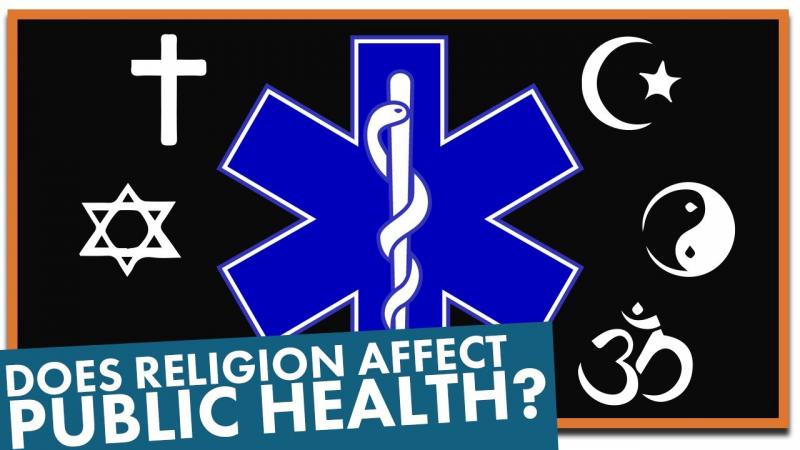
Public health training gives chaplain a different perspective
Kristin Godlin is an ordained Presbyterian minister and a chaplain at Carle and OSF Heart of Mary Medical Center in Urbana. She’s also a PhD candidate in the Department of Kinesiology and Community Health in the College of Applied Health Sciences at the University of Illinois.
That confluence gives Godlin a unique perspective in her role, but one she hopes doesn’t remain unique for long. Godlin’s research looks at the connection between religiosity and public health. Godlin, an alum of the Master of Public Health in AHS, said, “From a health standpoint, religion functions primarily as a means of helping people to cope with stress.”
Systematic reviews have found that religion is associated with decreases in depression, faster recovery from depression, less drug dependence, less drug abuse, better physical health, longer life, and an increased sense of purpose, well-being, hope and optimism.
Chaplains provide spiritual and emotional support to patients and their families. While most chaplains are themselves religious, they care for people of all faiths, as well as people who are not religious. Within the context of hospital emergency departments, chaplains additionally serve as a kind of go-between for staff members, patients, and their families. They also facilitate meetings between families and physicians.
But the public health portion of the job is one that is still quite new, even for Godlin. At the time she was board certified as a chaplain, there was an announcement made at the Association of Professional Chaplains' annual conference that the Templeton Foundation had provided a group of chaplaincy leaders called Transforming Chaplaincy a grant of $4.5 million for the purposes of helping to train chaplains to become more research literate. The idea, Godlin said, was that if chaplains were more research literate, they would be better able to guide and evaluate and advocate for their profession.
The money could be used to encourage chaplaincy training programs to include in their curricula courses and lessons in research methodology and statistics, or how to read and understand research, Godlin said. But also, a significant part of the grant was to enable 16 board-certified chaplains the opportunity to pursue Master of Public Health degrees or Master of Science degrees for the purposes of learning how to not only read research but to generate research to support chaplaincy.
“I didn't know hardly anything about public health when I started,” Godlin said. “I was a blank slate coming in. I think, particularly now that we have been going through the pandemic, I have a much greater understanding of what public health is all about and why they are approaching things the way they did than I ever would have before. And I really do think that's an extraordinarily important part of the training, which I didn't realize at the time I was getting it.”
The connection of religion and public health is particularly timely, Godlin said, because of COVID-19. Godlin recently came across a study which found that religiosity was negatively associated with intention to be vaccinated. "It was a sad commentary on how people who are more religious are less likely to take protective health measures,' she said. "It caused me to think about how important it is for religious leaders to have an understanding of what public health is all about.
“And the National Association for the Advancement of Science has recently started made a significant effort to try to introduce science into the core curricula of divinity schools and seminaries across America. I can see, especially during the pandemic, how important that is for religious leaders to understand how science works and why public health professionals are making the recommendations that they are.”
Godlin, who grew up in Champaign-Urbana, earned two masters' degrees from Yale Divinity School after doing her undergrad at Northwestern. But she returned to the area and trained as a chaplain and that’s when she got the research grant. At that point, she reached out to KCH assistant professor Robyn Gobin, because of Gobin’s interest in religion and spirituality and its effect on mental health.
"Dr. Gobin," Godlin said, "has been an extraordinarily helpful mentor and partner along the way."
"I shifted into the MPH-PhD program to focus more on research,” Godlin said. “Over the past few years, the focus of my research has been on the use of religion in coping with domestic violence. Studies find that up to 97% of women who experience domestic violence turn to God for help; so particularly for that population, religion is exceptionally important. My goal is to help religious leaders, chaplains, counselors, and therapists to strengthen their spiritual support for survivors, to help survivors to use their religion more effectively, and ultimately to improve survivors' physical and mental health outcomes."
Overall, Godlin believes the marriage of religion and public health through chaplaincy can help close the gap on misinformation.
“For the vast majority of people who have a religious background, when you say you are a chaplain, it opens doors that do not open for other people. And so people share things that they would not—patients share things and family members share things that they would not ordinarily share with other people.”
